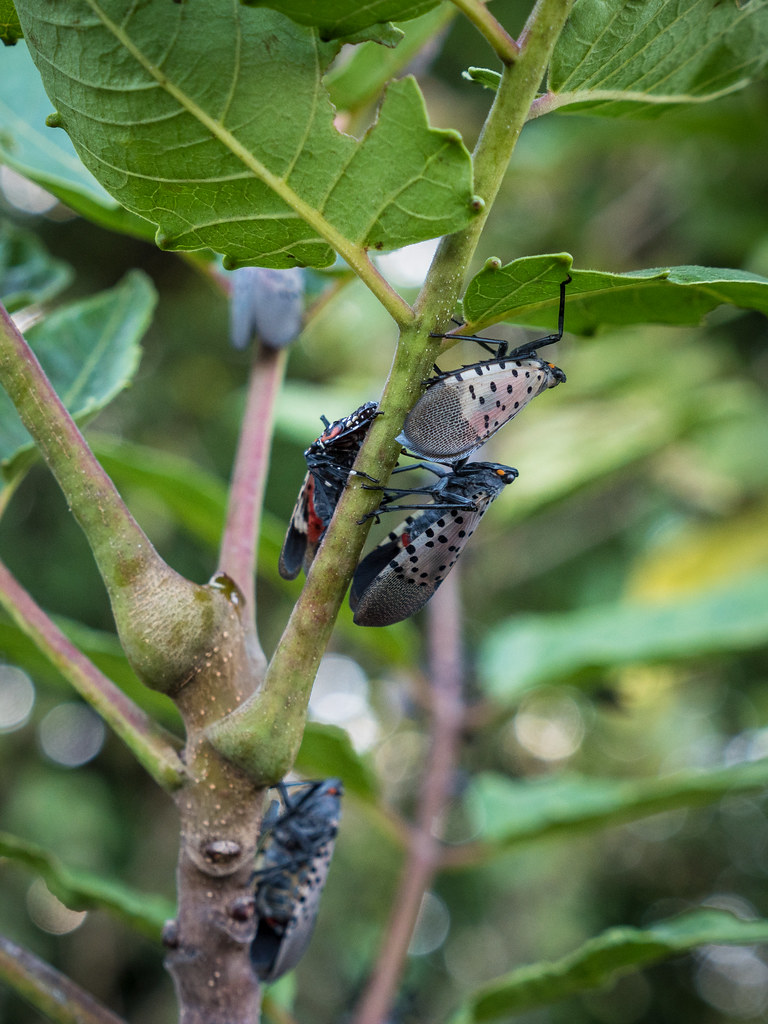Spotted Lanternflies: Do You Need a Permit?
How Did Spotted Lanternflies Get Here?
The Spotted Lanternfly (SLF) is native to China and was first detected in Pennsylvania in September 2014. Suspected of hitching a ride on a cargo shipment into Philadelphia, SLF has spread to 14 states: Connecticut, Delaware, Indiana, Maryland, Massachusetts, Michigan, New Jersey, New York, North Carolina, Ohio, Pennsylvania, Rhode Island, Virginia and West Virginia.
Since its arrival, states have taken strides to slow the spread of SLF and reduce its impact on the environment, residents and the economy.
The Impact of Spotted Lanternflies
 SLF threatens agriculture across the state from orchards and vineyards to hardwoods and nurseries. The insect feeds on sap in tree trunks, branches and twigs, leaving a grey/black oozing trail along the plant’s bark. This residue called “honeydew” can attract pests such as ants and bees, while also encouraging a fungal disease known as sooty mold on host plants, stunting their growth.
SLF threatens agriculture across the state from orchards and vineyards to hardwoods and nurseries. The insect feeds on sap in tree trunks, branches and twigs, leaving a grey/black oozing trail along the plant’s bark. This residue called “honeydew” can attract pests such as ants and bees, while also encouraging a fungal disease known as sooty mold on host plants, stunting their growth.
Over 70 plant species host the SLF including many hardwoods and agricultural plants that are vital to Pennsylvania’s economy, such as grapevines, maple trees, black walnut, birch, willow and more.
The Quarantine Zone
The SLF does not fly far, but it is a great hitchhiker. To slow the spread of this insect, the Spotted Lanternfly Order of Quarantine and Treatment was created, giving the Pennsylvania Department of Agriculture (PDA) authority to detect, contain and eradicate SLF. To that end, PDA began to implement quarantine zones within the state.
The quarantine prohibits the intentional movement of SLF and regulates the movement of items that may harbor the insect. These items can include, but are not limited to, landscaping or construction wastes, any tree parts including stumps or logs, decorative grapevines, packing materials like crates or pallets, recreational vehicles and tarps.
.png)
In 2017, the initial quarantine zone began with 14 counties in southeastern Pennsylvania. As SLF began to spread, the quarantine area also grew, and other states added their own quarantine areas and practices.
By 2021, the quarantine zone expanded three times and affected 45 counties, including Allegheny, Beaver, Butler, Washington, Westmoreland and other surrounding areas. Most recently, the quarantine zone expanded to include 51 of Pennsylvania's 67 counties.
Note that SLF is not uniformly distributed within quarantine zones. Some areas are heavily infested while other areas have few infestations.
Transportation by human activity is the most common form of movement and the main reason SLF populations have not been contained.
The Permit: Is It Required for You?
PDA requires businesses that regularly move items within quarantine zones or across the boundaries of quarantine zones to obtain a permit.
Company vehicles must carry a SLF permit. This permit indicates that a trained employee has inspected the vehicle and its contents for the presence of SLF. Drivers need to show the permit if stopped at a checkpoint.
PDA has developed the Spotted Lanternfly Quarantine Decision Tree to help you determine if your organization or business needs a permit.
States with quarantine zones issue their own SLF permits, but permits can apply to other states. Once you get one, other states will accept it.
Get Involved
ACCD will hold two workshops to review SLF identification, quarantine zones, permit compliance and best management practices. The training will conclude with a field walk and circle trap demonstration in collaboration with Penn State Extension and PDA.
Find the Right Workshop for You
-
SLF Management for Industry Professionals: August 24, 10:00 AM- 12:00 PM at South Park
Local businesses that transport goods or travel within the county are invited to a training on managing the growing threat of Spotted Lanternflies and obtaining required permits.
Register Now -
SLF Management for Municipalities: September 26, 10:00 AM- 12:00 PM at Boyce Park
Municipalities and park staff responsible for public land are invited to a training on managing the growing threat of Spotted Lanternflies and obtaining required permits.
Register Now
For more information about SLF permits, visit Pennsylvania Department of Agriculture.